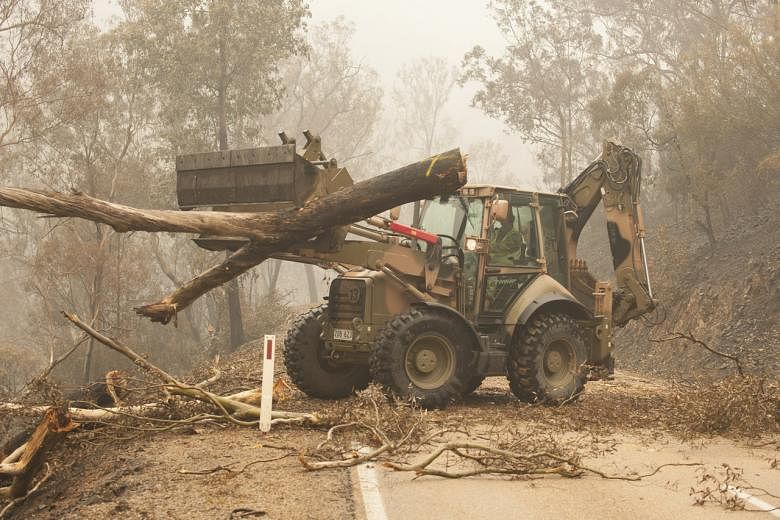SYDNEY (REUTERS, BLOOMBERG) - Australian firefighters used cool weather on Tuesday (Jan 7) to try to strengthen containment lines around almost 200 wildfires burning in the country's south-east, as Prime Minister Scott Morrison prepared to meet insurance and bank executives to discuss the crisis.
Fires have razed more than eight million ha of land across Australia, an area nearly the size of Austria, killing at least 25 people and destroying or damaging thousands of homes.
On Tuesday, two men were reported missing in New South Wales. Police did not reveal the identifies of the men, but said one is a 70-year old man.
The Insurance Council of Australia increased its estimate for damages claims from the fires to more than A$700 million (S$655 million) on Tuesday, with claims expected to jump further when more fire-hit areas are accessible.
Thousands of people have been left homeless, while many in rural towns have spent days without electricity, telecommunications and, in some cases, drinking water.
Military-coordinated rescue and support efforts were ongoing.
Mr Morrison, who has been criticised for his handling of the crisis, on Monday pledged A$2 billion to a newly created National Bushfire Recovery Agency, a commitment that could threaten his election promise to deliver the first budget surplus in more than a decade this financial year.
"There's going to be a very significant economic impact, but... we want to get money out into these communities as fast as possible," Treasurer Josh Frydenberg told the Australian Broadcasting Corp ahead of planned meetings between Mr Morrison and financial bosses.
Mr Morrison said he spoke with US President Donald Trump on Tuesday, while British Prime Minister Boris Johnson has also offered support.
On Monday he again signalled that his conservative government won't toughen policies to combat climate change, which has been blamed for exacerbating a crippling drought that's helped create tinderbox conditions.
A backbencher in Mr Morrison's government was criticised for an appearance on the Good Morning Britain ITV programme during which he said there was no link between climate change and the bush fire crisis.
"There is no link, the facts that cause the fires are the drought and the drying of the environment," lawmaker Craig Kelly said on the show.
On the ground on Tuesday, firefighters were working to get as much control over the huge blazes as possible before forecast high temperatures and winds return later in the week, threatening to ignite a fresh wave of fires.
"We need to remain vigilant," Mr Andrew Crisp, Victoria state's Emergency Management Commissioner Emergency Management Commissioner told reporters in an afternoon briefing. "We talk about benign conditions, and the fire is suppressed but it is still there. It is still tinder dry."
Australia's bushfire season started earlier than normal this year following a three-year drought that has left much of the country's bushland vulnerable to fires.
There are currently 138 fires ablaze across New South Wales state, but all were now back at the "advice" level, the lowest alert rating. Victoria state had 39 fires with 13 "watch and act" alerts.
All missing people across the country have been accounted for, said the authorities.
Almost 1,600 homes have been destroyed in New South Wales, Australia's most populous state, the authorities said. In Victoria state, the authorities believe 300 homes have been destroyed.
Insurers have received 8,985 bush fire-related claims in New South Wales, Victoria, South Australia and Queensland since the Insurance Council of Australia declared a bush fire catastrophe on Nov 8.
The claims are estimated to have a loss value of A$700 million. The council recorded the destruction of 1,838 residential properties so far.
Data released on Tuesday showed the fires were beginning to have an effect on the economy. The ANZ gauge of consumer confidence fell last week to its lowest level in more than four years, while its job advertisement data recorded the biggest monthly drop in seven months in December.
Australia's military were also deployed on Tuesday to help bury an estimated 4,000 dead sheep and cattle, a process authorities want to complete quickly to prevent rotting carcasses from spreading disease.

